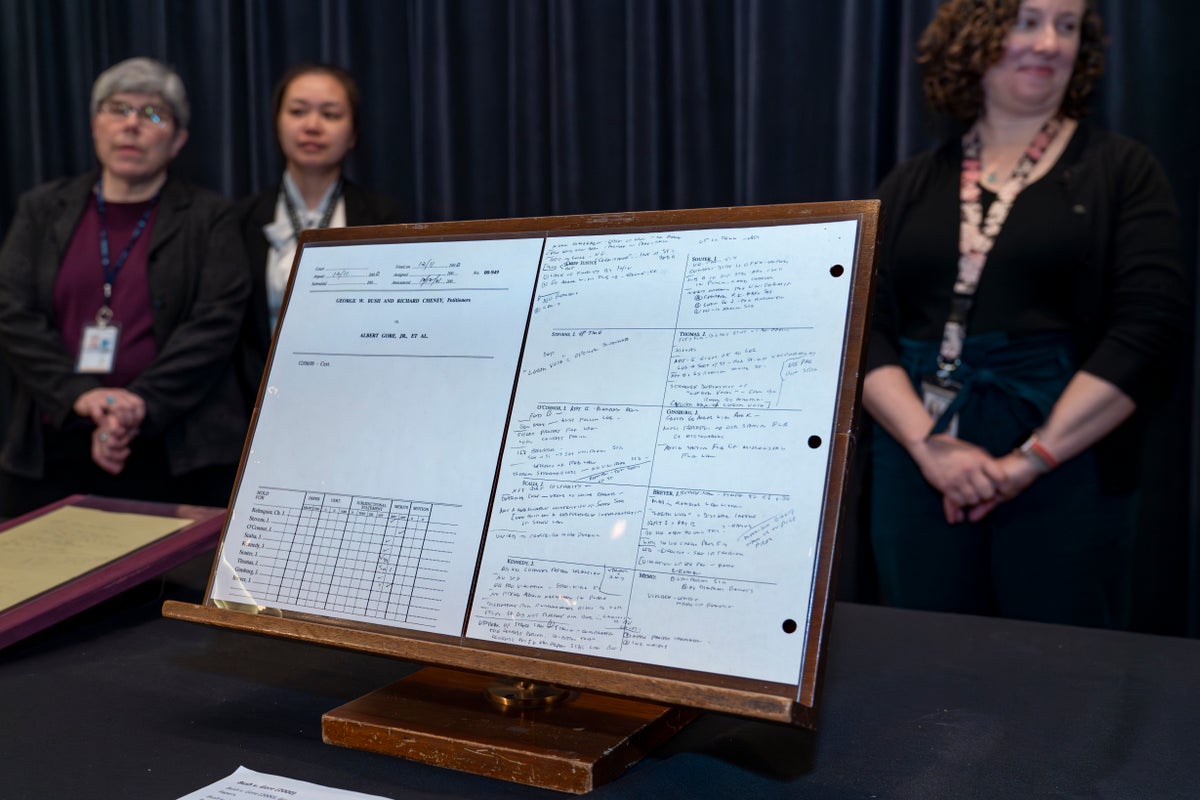
A wide-ranging selection of papers that belonged to Supreme Court Justice John Paul Stevens is opening to researchers Tuesday at the Library of Congress, providing a behind-the-scenes look at the justices' deliberations in important cases including Bush v. Gore, the 2000 decision that essentially decided the presidential election.
Stevens, who died in 2019, served on the Supreme Court for nearly 35 years. In that time, the court decided cases on issues including abortion, affirmative action, presidential power, gun rights and the rights of prisoners held at the Guantanamo Bay, Cuba, detention center. The papers being made public contain Stevens' notes from the justices' private conferences about cases, drafts of opinions and communications between the justices.
The collection's opening comes as the current court has recently ruled or is weighing some of the same major issues. Last year, the court's conservative majority overturned Roe v. Wade, giving states the ability to ban abortion after nearly 50 years. Now, the justices are deciding whether to do away with affirmative action, which has been upheld under Supreme Court decisions reaching back to 1978. An affirmative action decision is expected before the end of June, when the court traditionally finishes its work before taking a summer break.
Stevens was appointed to the court in 1975 by Republican President Gerald Ford and at first was considered a centrist, but he came to be seen as the court's leading liberal. Stevens said that he hadn't changed but that the court had grown more conservative around him. He did change his views on some issues, however. He morphed from a critic of affirmative action to a supporter, and he came to believe the death penalty is wrong.
The court has only become more conservative since Stevens' departure. Six of the court's nine members are conservatives, and the other three are liberals.
In Bush v. Gore, the case that ended Florida’s presidential recount and sent Republican George W. Bush to the White House over Democrat Al Gore, Stevens wrote a scathing dissent.
“Although we may never know with complete certainty the identity of the winner of this year’s presidential election, the identity of the loser is perfectly clear," he wrote. “It is the nation’s confidence in the judge as an impartial guardian of the rule of law.”
The Library of Congress says two or three boxes of papers in the collection relate to the case. Another case included in the newly available material is the court's 1992 decision in Planned Parenthood v. Casey, which had reaffirmed the right to abortion and was thrown out last year along with Roe v. Wade. Also of interest: Stevens' records in the Grutter v. Bollinger case from 2003, in which the court upheld affirmative action, and his records in several cases involving the rights of gay people.
Before joining the court, the Chicago-born Stevens served in the Navy during World War II. He became a judge on a federal court of appeals before becoming a justice. He retired in 2010 and was replaced by Justice Elena Kagan.
The Library of Congress first made a selection of Stevens' papers available in 2020. Those papers largely covered 1975 to 1984. The new selection opening Tuesday includes the years 1984 through 2004.
The justices' papers are considered personal property, and nothing dictates the justices must keep any records or make them public. Stevens is among several justices, along with Harry Blackmun and Thurgood Marshall, whose papers became public while at least one colleague still was on the bench.
Stevens' most recent files covering the period of 2005 to 2010, when the court ruled in two major gun rights cases, will not be open until 2030. That most recent period is when Stevens served with several current members of the court: Chief Justice John Roberts, Justice Samuel Alito and Justice Sonia Sotomayor. The only current justice represented in the papers now opening to the public is Justice Clarence Thomas.
The Library of Congress holds the papers of 38 Supreme Court justices.
___
Associated Press writer Mark Sherman contributed to this report.







